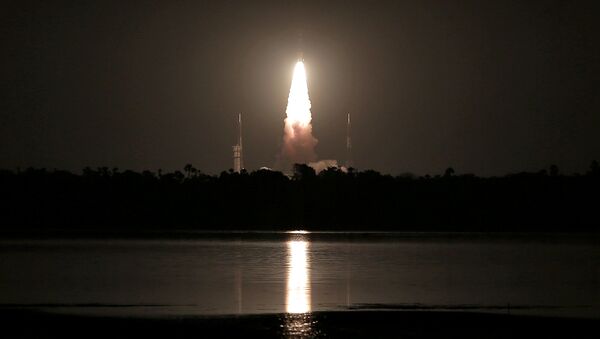The Indian Space Research Organization (ISRO) successfully launched two British commercial satellites into sun synchronous orbit, roughly 583 kilometers above Earth, a press statement said on Sunday.
Antrix Corporation Limited, the commercial wing of the ISRO, launched both satellites using its Polar Satellite Launch Vehicle (PSLV-C42) from the Satish Dhawan Space Centre in Sriharikota, India on Sunday at 16:38 Coordinated Universal Time.
The high-tech duo, named NovaSAR and S1-4, were developed by UK-based Surrey Satellite Technologies Limited (SSTL), a subdivision of French aviation giant Airbus, and use high-resolution optics for flood and disaster monitoring and forest mapping.
"The PSLV-C42 marks the latest technology and commercial collaboration between India and the UK with the launch of the combination of high resolution optical and radar (SAR) satellites from us," said Sir Martin Sweeting, SSTL group executive chairman told the ISRO.
"I am pleased to confirm that successful contact has been made with both satellites and they are in good health," Sir Sweeting continued while thanking the ISRO and Antrix for helping Britain to achieve its "long-held ambition to deliver low cost SAR remote sensing capabilities and services" to global customers.
The PSLV has endured 44 flights, with three launches this year. The PSLV-C40 set India's Cartosat 2 series into orbit in January and the PSLV-C41 launched the IRNS-1L navigation satellite in April.
To date, the ISRO has successfully launched 239 foreign satellites from 28 countries.
— ISRO (@isro) September 16, 2018
The NovaSAR-1 is the first SAR spacecraft entirely manufactured in Britain and is designed to test low-cost S-Band Synthetic Aperture Radar (SAR) platform. Using three NovaSAR satellites, SAR technologies can record images from any point on Earth regardless of time or weather conditions.
The UK Space Agency, Australian Commonwealth Scientific and Research Organisation (CSIRO) and ISRO are mission partners jointly commissioning the NovaSAR-1 for scientific research. The UK Space agency invested £21 million to develop the NovaSAR-1 and will share observation time with its Australian and Indian counterparts, SSTL said in a statement.
ISRO Chairman Dr. K Sivan also thanked the ISRO team for a successful mission. "This was unique night mission executed for the first time by us. The PSLV has proven yet again as a user-friendly vehicle in all aspects," he said.
"The credit goes to the entire ISRO team and industries. This success will give added energy for industries to make PSLV by themselves. We are going to have 18 missions in the next six months, virtually one launch every two weeks."



